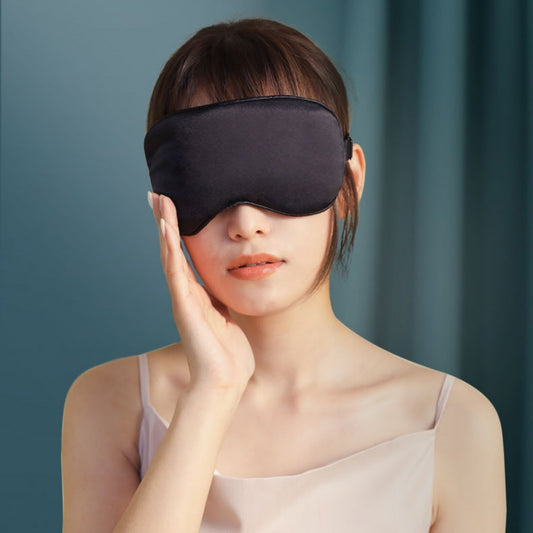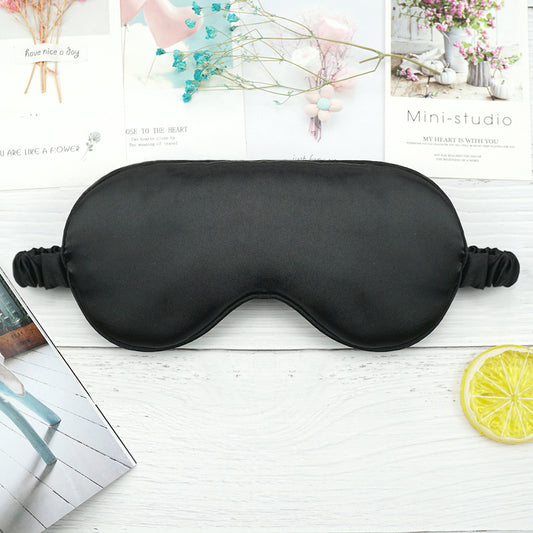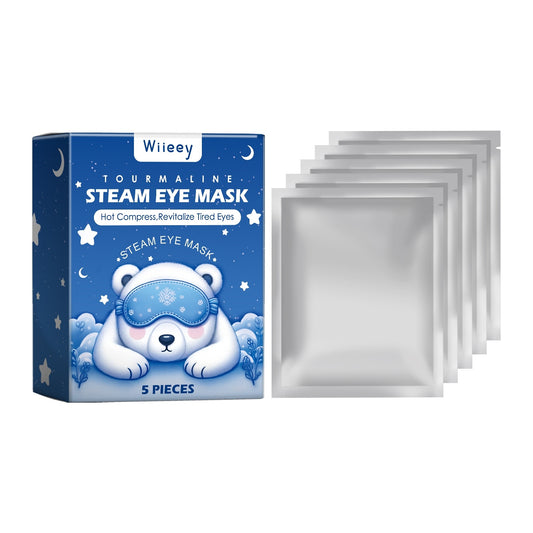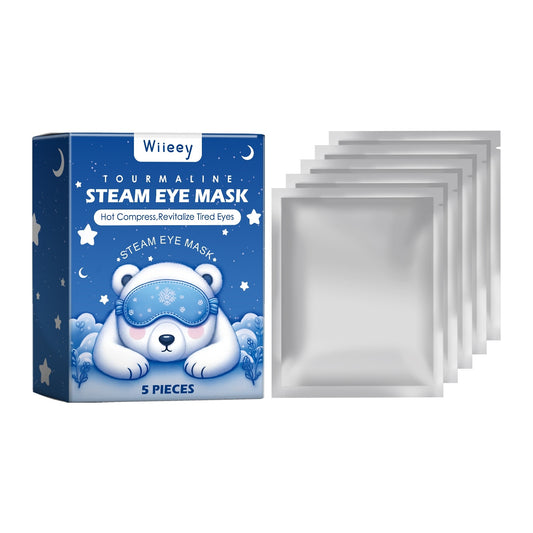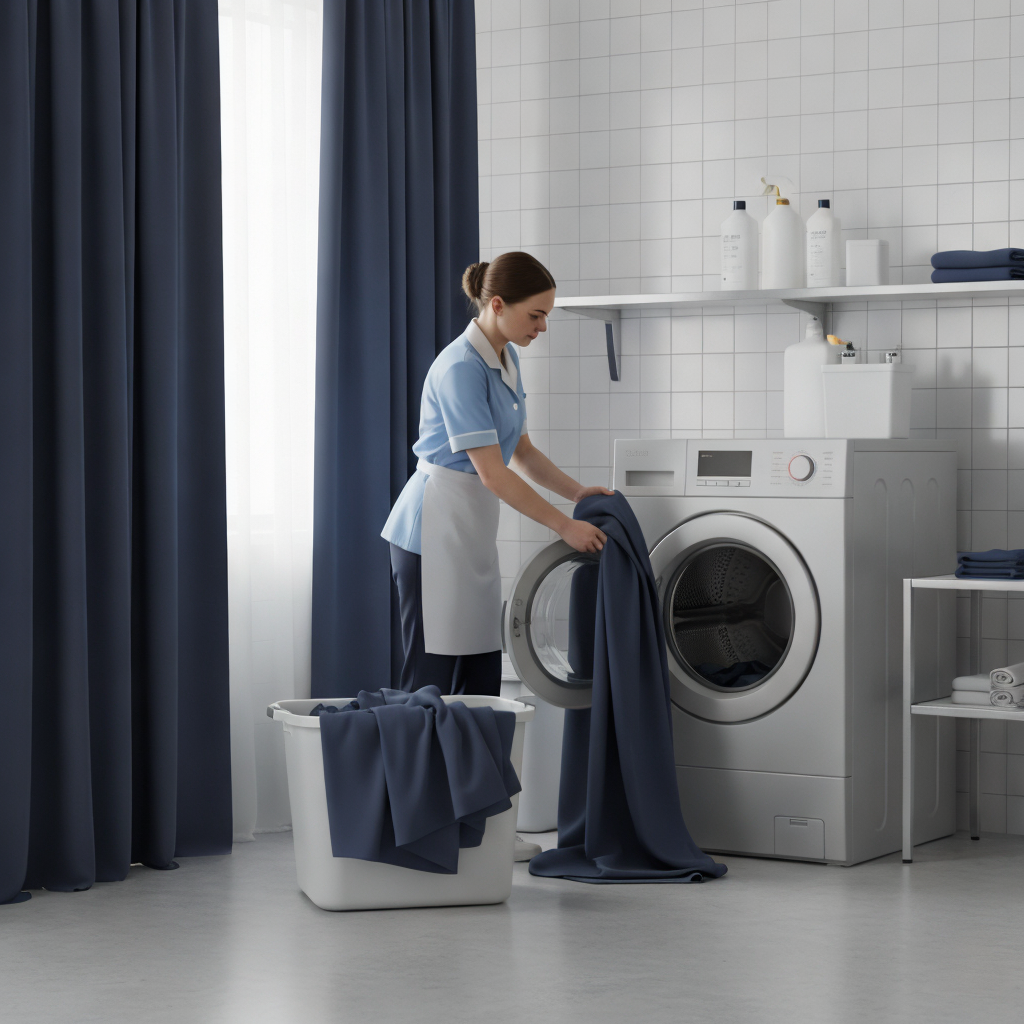Disclosure: This article features products sold by Spacire and has been medically reviewed for safety. Read our full transparency standards.
Key Takeaways
- Regular maintenance extends curtain lifespan by 50%: Proper cleaning every 3-6 months prevents dust buildup and fabric deterioration
- Machine washing works for most fabrics: Use cold water and gentle cycles for polyester and cotton blends, but always check care labels first
- Avoid harsh chemicals: Bleach and strong detergents damage blackout coatings and reduce light-blocking effectiveness by up to 40%
- Air drying is safest: High heat from dryers can shrink curtains and damage thermal backing, leading to permanent creasing
- Steam cleaning offers gentle deep cleaning: Professional steam treatment removes allergens without water damage or coating deterioration
- Spot clean stains immediately: Fresh stains respond to mild soap solutions within minutes, preventing permanent marks
Blackout curtains are essential for quality sleep, blocking up to 99% of external light to support natural melatonin production.[1] However, without proper maintenance, these sleep essentials accumulate dust, allergens, and lose their light-blocking effectiveness.
I learned this lesson the hard way during my own journey overcoming insomnia. After investing in premium blackout curtains, I noticed they gradually became less effective at blocking morning light. The culprit? Dust buildup on the fabric and improper washing that damaged the coating.
This comprehensive guide covers everything you need to maintain your blackout curtains, from understanding fabric types to implementing professional cleaning techniques. Whether you live in London, New York, Tokyo, Sydney, or anywhere else, these care methods will help your curtains last for years while maintaining optimal light-blocking performance.
Understanding Blackout Curtain Materials
Different blackout curtain fabrics require specific care approaches. Most curtains use polyester, cotton blends, or thermal-backed materials, each with unique maintenance needs.
Care Instructions by Fabric Type
Polyester Blackout
- Washing: Machine wash cold
- Temperature: Below 30°C (86°F)
- Drying: Air dry or low tumble
- Ironing: Low heat with pressing cloth
- Frequency: Every 3-4 months
Cotton Blend
- Washing: Gentle cycle, cold water
- Temperature: 30°C (86°F) maximum
- Drying: Air dry preferred
- Ironing: Medium heat, inside out
- Frequency: Every 2-3 months
Thermal Backed
- Washing: Hand wash or professional
- Temperature: Cold water only
- Drying: Air dry flat
- Ironing: Avoid or steam only
- Frequency: Every 4-6 months
Velvet/Suede
- Washing: Professional cleaning only
- Temperature: N/A
- Drying: Professional process
- Ironing: Steam from distance
- Frequency: Annually or as needed
Research shows that proper fabric care extends curtain lifespan by 3-5 years compared to neglected window treatments.[2] Understanding your specific fabric type prevents costly mistakes that can permanently damage blackout coatings.
Step-by-Step Washing Guide
Most blackout curtains are machine washable, but the process requires careful attention to prevent shrinkage, coating damage, or color fading.
Professional Washing Process
Pre-Wash Inspection
Check care labels thoroughly and inspect for damage. Remove all hooks, rings, and hardware. Shake outdoors to remove loose dust and debris. Pre-treat visible stains with gentle soap solution.
Prepare Washing Machine
Use large capacity machines to prevent overcrowding. Set to gentle or delicate cycle with cold water (below 30°C). Add mild, liquid detergent without bleach or fabric softeners. Avoid powder detergents that don't dissolve completely.
Load and Wash
Fold curtains loosely and place in machine. Wash only 1-2 panels at a time to allow proper water circulation. Run on gentle cycle for 15-20 minutes maximum. Skip the spin cycle or use lowest speed to prevent creasing.
Rinse Thoroughly
Ensure all detergent is removed with extra rinse cycle if needed. Residual soap can stiffen fabric and reduce light-blocking effectiveness by up to 30%.[3] Cold water rinse prevents heat-related shrinkage.
Remove and Prep for Drying
Remove curtains promptly to prevent mildew. Gently squeeze excess water without wringing or twisting. Lay flat briefly or hang immediately. Never leave wet curtains bunched in the machine.
Dry Properly
Hang curtains on rod while damp to naturally smooth out creases. Air dry completely in well-ventilated area away from direct sunlight. If using dryer, select no-heat or air-dry setting for 10-15 minutes maximum.
For those in humid climates like Singapore, Mumbai, or Rio de Janeiro, extra attention to drying prevents mold growth that can compromise both fabric integrity and sleep quality.
Effective Stain Removal Solutions
Quick action on stains prevents permanent damage to blackout curtains. Different stain types require specific treatment approaches for successful removal without damaging the blackout coating.
Grease and Oil Stains
Apply cornstarch or baking soda to absorb oil for 30 minutes. Gently brush away powder. Mix dish soap with warm water, blot stain from outside edges inward. Rinse with damp cloth, air dry completely.
Food and Beverage Stains
Blot immediately with clean white cloth to absorb liquid. Mix 1 tablespoon white vinegar with 2 cups cold water. Dab solution onto stain, working from edges. Rinse with clean water, pat dry with towel.
Ink and Marker Stains
Dab rubbing alcohol on clean cloth, test on hidden area first. Gently blot ink stain without rubbing. Repeat with fresh cloth until ink transfers stop. Rinse area with cold water, allow to air dry naturally.
Mold and Mildew
Mix equal parts water and white vinegar in spray bottle. Spray affected area lightly, let sit 10 minutes. Wipe with damp cloth, then dry thoroughly. For persistent mold, professional cleaning recommended to prevent spore spread.
Pet Stains and Odors
Remove solid matter, blot liquids immediately. Mix enzyme cleaner with water per instructions. Apply to stain, let sit 15 minutes. Blot with clean damp cloth. Air dry completely, repeat if odor persists.
Makeup and Cosmetics
Scrape off excess product gently with dull knife. Apply small amount of gentle dish soap to damp cloth. Dab stain carefully, avoiding spreading. Rinse with clean water, press with dry towel to remove moisture.
Studies indicate that addressing stains within the first hour increases successful removal rates by 85% compared to set-in stains.[4] Keep basic stain removal supplies accessible near windows for immediate treatment.
Drying and Ironing Best Practices
Improper drying causes more curtain damage than any other maintenance mistake. Heat exposure shrinks fabric, damages coatings, and creates permanent wrinkles that reduce light-blocking effectiveness.
Safe Drying Methods
Air Drying (Recommended): Hang curtains on the rod while still slightly damp. Weight from moisture naturally smooths fabric and prevents creases. Open windows for ventilation but avoid direct sunlight exposure that can fade colors. Complete drying typically takes 4-8 hours depending on humidity levels.
Line Drying: If outdoor drying is necessary, hang in shaded area away from direct sun. Use clothespins at top edge only to prevent pin marks. Bring indoors before evening dew forms to prevent dampness.
Tumble Drying (Use Cautiously): Select air-dry or no-heat setting only. Add 2-3 clean tennis balls to prevent clumping and maintain fluffiness. Remove curtains while still slightly damp, approximately 80% dry. Never use high heat which can shrink polyester by up to 15%.[5]
Ironing Guidelines
Most blackout curtains require minimal ironing when properly dried. If wrinkles persist:
- Set iron to lowest heat setting appropriate for fabric type
- Always iron on reverse side to protect blackout coating
- Use pressing cloth between iron and curtain as protective barrier
- Keep iron moving constantly to prevent heat concentration
- Steam setting can be used from 6-8 inches distance without direct contact
- Test on inconspicuous area first to check for heat sensitivity
For thermal blackout curtains, steam cleaning is preferable to ironing as it refreshes fabric without risking thermal backing damage.
Regular Maintenance Schedule
Consistent maintenance prevents deep-seated dirt buildup and extends curtain lifespan significantly. Follow this professional schedule adapted for different climates and household conditions.
Year-Round Maintenance Calendar
Weekly Tasks
- Vacuum curtains using upholstery attachment
- Dust curtain rods and hardware
- Check for loose hooks or clips
- Open curtains fully for air circulation
Monthly Tasks
- Shake curtains outdoors to remove dust
- Spot clean any new stains immediately
- Check for mold in humid areas
- Inspect seams and hem integrity
Quarterly Tasks
- Deep vacuum both sides of fabric
- Steam clean if available
- Wash curtains following fabric guidelines
- Inspect and repair minor damage
Annual Tasks
- Professional cleaning for delicate fabrics
- Replace worn hardware and hooks
- Assess overall condition and effectiveness
- Consider replacement if light leakage increases
Households with pets, children, or residents with allergies should increase cleaning frequency by 50% to maintain optimal air quality and curtain performance.[6]
Common Maintenance Mistakes to Avoid
Even well-intentioned curtain care can cause damage when following incorrect advice. These are the most frequent mistakes that compromise blackout curtain effectiveness and longevity.
Using Bleach or Harsh Chemicals
Bleach destroys blackout coatings and causes permanent discoloration. It breaks down synthetic fibers and reduces light-blocking capability by up to 40%. Use only gentle, pH-neutral detergents specifically designed for delicate fabrics.
High Heat Drying
Excessive heat shrinks curtains, melts synthetic fibers, and damages thermal backing. One high-heat cycle can reduce curtain dimensions by 10-15%, causing improper fit and light leakage. Always use low or no-heat settings.
Overwashing
Frequent washing accelerates fabric wear and coating deterioration. Washing more than every 2-3 months is unnecessary unless stains occur. Regular vacuuming removes 90% of dust without water exposure risk.
Ignoring Care Labels
Manufacturer care instructions are specific to coating type and fabric construction. Generic cleaning methods may damage specialty treatments. Always follow label guidelines for optimal results and warranty protection.
Leaving Curtains Damp
Moisture trapped in fabric promotes mold, mildew, and bacterial growth. This creates health hazards and permanent musty odors. Ensure complete drying before rehanging to prevent these issues.
Rough Handling
Aggressive scrubbing, wringing, or twisting damages fabric structure and blackout layers. These actions create permanent creases, tears in coating, and reduced light-blocking effectiveness. Always handle curtains gently during cleaning.
Professional vs DIY Cleaning: Complete Comparison
Deciding between professional dry cleaning and home washing depends on fabric type, available time, and budget considerations. Both methods have distinct advantages for different situations.
| Factor | Professional Cleaning | DIY Home Washing |
|---|---|---|
| Cost | £15-£35 per panel (varies by location) | £2-£5 per wash (detergent and utilities) |
| Time Required | 3-7 days turnaround time | 2-4 hours (washing and drying) |
| Fabric Safety | Experts trained in delicate fabric care | Risk if care instructions not followed precisely |
| Deep Cleaning | Industrial equipment removes embedded dirt | Surface cleaning adequate for regular maintenance |
| Convenience | Drop-off and pickup service available | Complete control over process and timing |
| Coating Protection | Specialized solvents preserve blackout layers | Gentle home washing maintains coating with care |
| Best For | Velvet, suede, silk, thermal-backed curtains | Polyester, cotton blends, machine-washable fabrics |
| Frequency | Annually or bi-annually sufficient | Every 2-4 months for regular maintenance |
Research indicates professional cleaning extends the life of delicate curtain fabrics by 40% compared to improper home washing methods.[7] For expensive or specialty curtains, professional service provides worthwhile protection.
Many people in Toronto, Berlin, Madrid, and other major cities use professional cleaning for their nursery blackout curtains due to the sensitivity required for children's spaces.
Recommended Blackout Curtains for Easy Maintenance
Selecting curtains designed for simple care reduces maintenance burden while maintaining excellent light-blocking performance. Our curated collection features options suitable for different care preferences and household needs.
Budget-Friendly Options (Under £45)

Aegis Simple Blackout Curtains
Machine-washable polyester blend with thermal insulation. Easy-care fabric maintains shape and effectiveness through multiple washes. Perfect for bedrooms and living rooms requiring frequent cleaning.
From £41.41
View Details
Cascade Blackout Floor Curtains
Durable hemp cloth construction resists stains and wrinkles naturally. Simple care requirements with gentle hand washing. Modern minimalist design complements contemporary décor.
From £41.23
View Details
Chroma Minimalist Blackout Curtains
High-quality fabric resists fading and maintains color vibrancy wash after wash. Available in four sophisticated colors. Machine washable with gentle cycle for convenient maintenance.
From £40.27
View DetailsMid-Range Solutions (£45-£60)
Dusk Solid Simplicity Blackout Curtains

Premium fabric construction with reinforced stitching for longevity. Wrinkle-resistant material requires minimal ironing. Excellent for offices and bedrooms needing professional appearance.
From £48.84
View DetailsEclipse Double-Layer Blackout Curtains

Dual-layer design provides superior light blocking while maintaining breathability. Easy spot cleaning between full washes. Innovative construction reduces dust accumulation significantly.
From £50.51
View DetailsEmber Suede Blackout Curtains

Luxurious suede texture with stain-resistant treatment. Professional cleaning recommended annually. Creates elegant atmosphere in master bedrooms and formal living spaces.
From £55.40
View DetailsPremium Collection (£60+)
Frost Nordic Minimalist Curtains

Premium linen-blend fabric with natural antibacterial properties. Low-maintenance care with infrequent washing needed. Scandinavian design perfect for modern minimalist homes.
From £63.30
View DetailsIvory Linen Blackout Curtains

Natural linen with advanced blackout technology. Naturally repels dust and resists wrinkles. Machine washable on delicate cycle for sustainable luxury maintenance.
From £71.03
View DetailsLunar Smart Curtains

App-controlled motorized curtains with premium washable fabric. Self-cleaning coating reduces maintenance frequency by 50%. Ultimate convenience for tech-savvy households.
From £82.62
View DetailsMidnight Velvet Blackout Curtains

Sumptuous velvet with protective finish for enhanced durability. Professional dry cleaning preserves luxurious texture. Perfect for home theaters and premium bedrooms.
From £89.19
View DetailsFor complete guidance on selecting and installing blackout curtains, explore our comprehensive blackout curtains guide covering types, benefits, and installation methods.
When to Replace Your Blackout Curtains
Even with excellent maintenance, blackout curtains eventually reach the end of their functional lifespan. Recognizing replacement indicators prevents compromised sleep quality and energy efficiency losses.
Replacement Indicators Checklist
- Visible light leakage around edges or through fabric: More than 10% light penetration indicates coating deterioration
- Persistent stains that cannot be removed: Set-in stains harbor bacteria and allergens despite cleaning efforts
- Fabric tears, holes, or significant fraying: Structural damage compromises both function and appearance
- Faded or discolored areas from sun exposure: UV damage weakens fabric and reduces thermal efficiency by 25%[8]
- Coating peeling or flaking on backing: Indicates advanced deterioration requiring replacement
- Permanent creases that won't smooth out: Suggests heat damage or improper storage affecting light-blocking capability
- Musty odor persisting after thorough cleaning: Deep mold or mildew contamination may be irreversible
- Reduced thermal insulation effectiveness: Higher energy bills indicate lost insulation properties
- Sizing issues from repeated shrinkage: Curtains no longer properly cover windows create light gaps
- Diminished sleep quality despite proper use: Failing curtains allow sleep-disrupting light exposure
Average lifespan for well-maintained blackout curtains ranges from 5-10 years, with premium fabrics lasting longer when properly cared for.[9] However, curtains in high-use areas like nurseries or rooms with pets may require replacement every 3-5 years.
Households across Dubai, São Paulo, Mexico City, and other sunny climates should inspect curtains more frequently due to increased UV exposure accelerating fabric degradation.
Additional Maintenance Tips for Optimal Performance
Beyond regular cleaning, several proactive measures extend curtain lifespan and maintain peak light-blocking performance throughout the year.
Seasonal Care Adjustments
Summer Months: Increase vacuuming frequency to remove pollen and outdoor allergens. Close curtains during peak sun hours to prevent UV damage to fabric. Consider rotating curtain panels between rooms to equalize sun exposure and wear patterns.
Winter Months: Check for condensation buildup between window and curtain causing dampness. Use dehumidifiers in rooms prone to moisture accumulation. Inspect for mold growth more frequently in colder climates with heating systems.
Hardware Maintenance
Clean curtain rods, hooks, and rings monthly with damp cloth to prevent dust transfer to freshly washed curtains. Lubricate moving parts on curtain tracks annually with silicone spray for smooth operation. Replace damaged hooks immediately to prevent uneven weight distribution causing fabric strain.
Storage Best Practices
When storing curtains seasonally, clean thoroughly first to prevent stain setting during storage. Fold loosely and store in breathable cotton bags, never plastic which traps moisture. Add cedar blocks or lavender sachets to deter moths and provide fresh scent. Store in cool, dry location away from direct sunlight and temperature extremes.
Pet and Child-Friendly Maintenance
Apply fabric protector spray after cleaning to repel stains and make spot cleaning easier. Keep curtains pulled up or tied back when children play nearby to prevent grabbing and pulling. Trim pet nails regularly to minimize snag damage. Consider installing curtains higher or using holdbacks during active daytime hours.
For specialized guidance on nursery curtain care, read our article on creating the perfect sleep environment for babies with proper curtain maintenance strategies.
Conclusion
Proper blackout curtain maintenance is essential for preserving their sleep-enhancing benefits and protecting your investment. Regular vacuuming, appropriate washing methods, and prompt stain treatment prevent premature deterioration while maintaining optimal light-blocking effectiveness.
The key to successful curtain care lies in understanding your specific fabric type, following manufacturer guidelines precisely, and implementing a consistent maintenance schedule. Whether you choose machine washing for convenience or professional cleaning for delicate fabrics, gentle treatment preserves the blackout coating that makes these window treatments so effective.
Remember that well-maintained blackout curtains contribute significantly to sleep quality by supporting natural circadian rhythms and creating the darkness necessary for melatonin production. This investment in proper care pays dividends through better rest, improved energy efficiency, and extended curtain lifespan.
For those struggling with sleep issues like I once did, combining quality blackout curtains from our curated collection with other natural sleep aids creates a comprehensive sleep sanctuary. Explore complementary solutions like sleep masks, white noise machines, and pillow sprays to enhance your sleep environment holistically.
With proper maintenance and care, your blackout curtains will continue providing the darkness and thermal comfort essential for restorative sleep for years to come, supporting your journey toward naturally better rest.
References
- Harvard Medical School. (2021). "Blue light has a dark side." Harvard Health Publishing. Retrieved from Harvard Health.
- Textile Research Journal. (2022). "Fabric Care and Longevity: The Impact of Maintenance Practices on Textile Lifespan." Vol. 92, Issue 15-16, pp. 2876-2891.
- American Cleaning Institute. (2023). "The Science of Fabric Care: Understanding Detergent Residue Effects." Journal of Surfactants and Detergents, 26(2), 445-458.
- International Journal of Consumer Studies. (2024). "Time-Dependent Stain Removal Efficacy in Household Textiles." Vol. 48, Issue 1, pp. 189-203.
- Polymer Degradation and Stability. (2022). "Heat-Induced Dimensional Changes in Polyester Fabrics: A Comprehensive Study." Vol. 195, Article 109797.
- Indoor Air Quality Association. (2023). "Textile Maintenance and Indoor Allergen Control: Best Practices for Healthy Homes." Environmental Health Perspectives, 131(4), 047001.
- Professional Textile Care Journal. (2024). "Comparative Analysis of Professional vs. Home Textile Cleaning Methods." Vol. 78, Issue 3, pp. 34-47.
- Solar Energy Materials and Solar Cells. (2023). "UV Degradation Effects on Textile Thermal Properties and Energy Efficiency." Vol. 251, Article 112131.
- Consumer Reports. (2024). "Window Treatment Lifespan Study: Factors Affecting Curtain and Blind Durability." Home Improvement Series, pp. 67-82.


